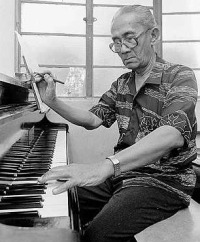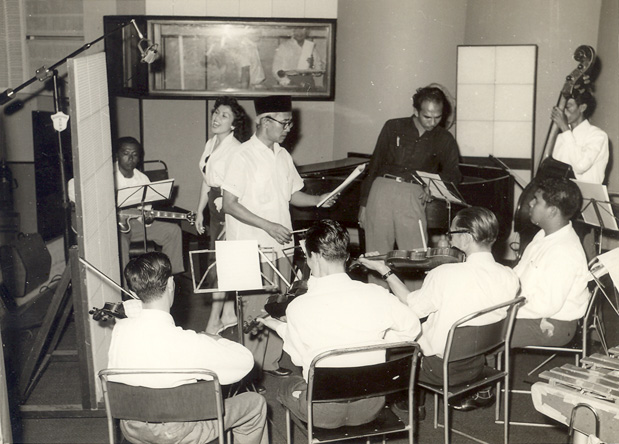<Back to Index>
- Biochemist Selman Abraham Waksman, 1888
- Composer Zubir Said, 1907
- 7th Governor of Wisconsin Louis Powell Harvey, 1820
PAGE SPONSOR

Zubir Said (22 July 1907 – 16 November 1987) was a Singaporean composer originally from the Minangkabau highlands of Indonesia who composed the national anthem of Singapore, "Majulah Singapura" ("Onward Singapore"). A self taught musician, Zubir also worked as a score arranger and songwriter for Cathay - Keris Film Productions for 12 years, composing numerous songs for the company's Malay films. He is believed to have written about 1,500 songs, with less than 10% of them ever recorded.
It has been said that Zubir was viewed by many as a composer with a "true Malay soul", as his songs were interwoven with historical messages and Malay truisms, and that he and his Minangkabau contemporaries awoke a wave of national consciousness in the 1950s.
The eldest child in a family of three boys and five girls, Zubir Said was born on 22 July 1907 in Bukittinggi in the Minangkabau highlands of West Sumatra, Indonesia. His mother died when he was seven years old. He attended a Dutch school but had no interest in academic studies. His involvement with music started when he was introduced to the Solfa music system by a teacher. A primary school classmate subsequently taught him how to make and play a flute, and in middle school, he learned to play the guitar and drums from fellow students and the keroncong group he was involved in.
In 1928 at the age of 21, Zubir went to
Singapore to
make a living as a musician, taking up the suggestion of a sailor
friend who had described the island as a place of "glittering lights, kopi susu [coffee
with milk] and butter". This was done in the face of objections from
his village chieftain father, Mohamad Said bin Sanang, who believed
music to be against religion. Zubir's first job was as a musician with
City Opera, abangsawan or Malay opera troupe. He became the troupe's bandleader. Thereafter, in 1936, he joined the recording company His Master's Voice. Zubir went to Java to marry Tarminah Kario Wikromo, a keroncong singer,
in 1938; they returned to Zubir's home town of Bukittinggi in 1941 just
before the outbreak of World War II. Coming back to Singapore in 1947,
Zubir worked as a part time photographer with the Utusan Melayu newspaper while composing and performing music and songs. In 1949 he took up the post of orchestra conductor at Shaw Brothers' Malay Film Production, and in 1952 he joined Cathay - Keris Film Productions as a score arranger and songwriter for the company's Malay films, including Sumpah Pontianak (Blood of Pontianak, 1958) and Chuchu Datuk Merah (Grandchildren of Datuk Merah, 1963). In 1957, he received his first public recognition when his songs were performed at the Victoria Theatre.
In 1962, Zubir's songs for the movie Dang Anom won an award at the Ninth Asian Film Festival in Seoul, South Korea. He continued working for Cathay - Keris Film Productions until he retired in 1964, composing numerous songs for Malay films.
He also gave music lessons, and often had other music artists visiting him to talk about music and asking for advice. His third and youngest daughter Puan Sri Dr. Rohana Zubir, a retired lecturer with the University of Malaya, recalled how the family home in Singapore was always filled with music. He was the heart of the conversation, very enthused and willing to share pearls of wisdom so that others could benefit from his work. This generosity extended to other areas of his life. He helped his own family in Sumatra and families in Singapore he had "adopted", sending them medicine and other items with what little he could afford, even though his own family was not well off at the time.
Zubir said he was never driven by money. He believed that money was essential for his survival and to look after the family, and that the money he earned from giving music lessons and his compositions for the film world sufficed. He valued honesty and sincerity in his work and placed importance on purity and originality, whether in his music, lyrics or style of singing. He stopped composing songs for the film company when he was upset about the management's decision to cut production costs by borrowing existing music to be used for dubbing on to the background music of some films.
Zubir died at the age of 80 on 16 November 1987 at Joo Chiat Place in Singapore, survived by four daughters and a son. Despite his legacy, Zubir left only S$ 20,000 to his name and the family had no home to call its own. In 1990 Zubir's life and passion as a musician were documented in a book titled Zubir Said: His Songs, and in 2004 a S$20,000 bronze bust of a bespectacled Zubir was installed in Gallery 6 of the Malay Heritage Centre which pays tribute to icons in Malay arts and culture.
In recognition of his contributions to the State, Zubir was conferred the Sijil Kemuliaan (Certificate of Honour) on 16 March 1963 and the Bintang Bakti Masyarakat (Public Service Star) in the same year. In 1971, he received the Jasawan Seni (cultural medallion) award from eight Malay cultural organizations, and the Asean Cultural and Communications Award in 1987. He also received a Certificate of Commendation from the Amalgamated Union of Public Employees (AUPE) for composing the AUPE song. In 1995, Zubir was posthumously given a Lifetime Achievement Award by the Composers and Authors Society of Singapore (COMPASS).
On 8 May 2009 the Acting Minister for Information, Communications and the Arts, Rear Admiral (NS) Lui Tuck Yew, announced that the address of the permanent campus for the School of the Arts (Sota) near The Cathay will be 1 Zubir Said Drive, in honour of the late composer.
Zubir is primarily remembered for composing Singapore's national anthem, "Majulah Singapura" ("Onward Singapore"). The Malay lyrics exhort Singaporeans to "progress towards happiness together" ("Sama - sama menuju bahagia") so that their "noble aspiration[s] bring Singapore success" ("Cita - cita kita yang mulia / Berjaya Singapura"), and to "unite in a new spirit" ("Marilah kita bersatu / Dengan semangat yang baru").
In 1956, he also submitted three song compositions to the Malayan – later Malaysian – Government for consideration for their national anthem. However, a different song, "Negaraku", was selected in the end.
Zubir is also remembered for his composition "Semoga Bahagia" ("May You Achieve Happiness") which was aimed at primary school students, advising them to work hard for their future. It has become a Children's Day song for Singaporean children, and is thus often sung in schools on 1 October. It is also performed during the Singapore Youth Festival.
Zubir is estimated to have written about 1,500 songs, including those written for Cathay - Keris Film Productions' Malay films in the 1950s and 1960s. Less than 10% of these songs were recorded. On 22 August 2007, Zubir's family signed an agreement with Universal Music in Malaysia for the latter to manage his works. The copyright in the songs remains with his family. The idea to do so came after his daughter Dr. Rohana met Sandy Monteiro, senior vice - president (Asean) of the Universal Music Publishing Group in 2005 through Monteiro's wife, who was a good friend of hers. Dr. Rohana was reported as saying: "It is time to hand over the songs in order to revive them two decades after my father's passing. I hope to ensure that his songs continue to live in the hearts of young artists in Malaysia."
It
is said that Zubir was viewed by many as a composer with a "true Malay
soul", as his songs, traditional but yet modern and patriotic, were
interwoven with historical messages and Malay truisms. Journalist A.
Samad Ismail commented that Zubir and his Minangkabau contemporaries
awoke a wave of national consciousness in the 1950s.
